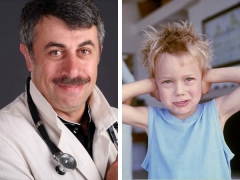Dr. Komarovsky about what to do if the child does not obey their parents
There is no such child who would always obey his parents. Even very docile and easy-going kids from time to time "rebel" and show character. And some children behave this way very often, which causes chagrin and anxiety among moms and dads. The famous doctor Yevgeny Komarovsky tells why a child does not obey his parents and what to do in this situation.
Pedagogical problems through the eyes of a medic
Evgeny Komarovsky is addressed not only about the common cold, flat-footedness and other ailments. Quite often, parents bring their children to the pediatrician and complain that the pussy has become disobedient. Usually this problem occurs in families where children have already turned 4 years old. It is too late, says Komarovsky, to raise issues of education and obedience when the child has turned 1.5-2 years old, and ideally since birth.
The child begins to behave in opposition to the parental opinion in two cases: if he was given too much freedom from birth and if he was too often told the word "not allowed". The task of parents is to find the very “golden” balance between these extremes.
Democracy in the family, giving the child equal rights with adults, leads to the upbringing of a disobedient and capricious child, who will be hysterical and scandalous to achieve his own way if something is forbidden to him.
Tantrums
If the child once tried the method of hysteria and it was crowned with success (he got what he wanted), then, without a doubt, the crumb will use this method of manipulation by parents and grandmothers often. Therefore, if the disobedient child suddenly began to organize "concerts", with beating his head on the floor and walls, shouting, in the literal sense of the word, until blue in the face, the best way is to ignore it, says Yevgeny Komarovsky.
If there is no spectator in the face of mom or dad, then the baby simply has no motivation for hysterics. If it screams, you need to leave the room where the drama unfolds; if it beats, put a pad to make it softer and leave the room. For parents, this stage is the most difficult.
Komarovsky advises to be patient, valerian and optimistic - everything will definitely work out if mom and dad are consistent in their actions.
Do not be afraid that the child suffocates during a tantrum, even if it shows with all appearance that this is about to happen. According to Komarovsky, children often exhale from the lungs the whole supply of air, including reserve air, when crying, this causes a long pause before inhaling. If there are serious fears, you just need to blow the baby in the face - he reflexively take a breath.
Physical punishment
Dr. Komarovsky opposes physical punishment, because a child who from an early age realized that the one who is stronger wins will use this knowledge all his life. Of these people who are used to solving problems with others with the help of force, nothing good will grow.
If a mom or dad cannot solve problems with their child without the use of physical force, this is a reason for going to a specialist - parents need counseling from a psychologist or psychotherapist. And this is reasonable and correct, says Komarovsky.
There are enough variants of punishment without a belt: an explanation of why something cannot be done, temporary deprivation of certain benefits (sweets, new toys).The main thing is that the punishment is adequate and timely: if the child behaved badly in the morning, and he was deprived of the evening watching cartoons, he no longer remembers why he was punished.
Putting the kid in the corner is a reasonable enough way to punish.
A child in a conflict situation needs to be alone with himself, without toys, without cartoons and other entertainment. Komarovsky advises to put the baby in the corner exactly for as many minutes as the child is 3 years old (3 years - 3 minutes, 5 years - 5 minutes).
In the process of punishment, parents should not deprive the toddler of what he needs for life - walking in the fresh air, drinking and eating.
Tips of Dr. Komarovsky
A categorical “no” should be said only when the situation poses a potential danger to the health and life of the child and his family. Wire in the socket - it is impossible, booty on a cold tile - it is impossible.
If the child just throws out toys, then this prohibition is inappropriate here. It is better to explain why it is ugly, uncomfortable, and why it is preferable to remove the toys after all. Then the ban will be perceived by the baby as something really important. The more often he hears the "no", the less he attaches importance to him.
Demanding something and arguing their demands, parents should stand their ground to the end.
That of what could not be yesterday, should not be today. All family members must support the requirement and not change their decisions. This is an excellent prevention for children’s isdetskikh terik.
If a mother teaches a child to “pronounce” her emotions, call feelings with words (which is very hard for all children!), This will help the child to more easily go through all the “age crises” that happen in 2-3 years, 6-7 years and even at the age of 14-16, when crises are already teenage and serious.
The ability to express their emotions frees the child from having to scream. If he does not know how to do this, then a cry and a cry on his part is the only way to show his parents that something incomprehensible, bad is happening to him, which he cannot explain.
Dr. Komarovsky will tell you more about the rules for raising a naughty child in his program.





















